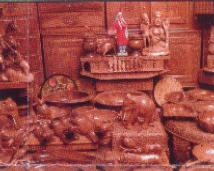Soil and Forest Resources
Vegetation and Soil Types
Vegetation is influenced by climate, rainfall soil and altitude. Since these factors vary as the altitude rises from the outer plains of Jammu Province to the loftiest mountain ranges of the Inner Himalayas, it is but natural that the vegetation should vary from the Inner Himalayas to the middle mountains and the outer plains of Jammu region.
Forests
Forests are one of the most important resources of Jammu and Kashmir. Spread over 2,236 sq. kms. of the demarcated area forests accounts for 20% of the total geographical area of the state on this side of the Line of Control. More than 99% of forest area is confined to the province of Jammu & Kashmir only, with largest area of 5848 sq. kms. in district of Doda and smallest are of 481 sq. kms. in the district of Budgam. Over 19,236 sq. kms. is under coniferous softwood (Pine) and 946 sq. kms. under non-coniferous softwood. In the coniferous category.Fir accounts for 3355 sq. kms., Kail for 1874 sq. kms., Chir for 1773 sq. kms. and Deodar for 1122 sq. kms. Forests require abundance of moisture in the soil. So they are found in the areas where there is sufficient rainfall or along the banks of the rivers where sufficient water is available. In the State of Jammu and Kashmir forests are mainly found where annual rainfall is about 100 cms. However, scrub forests are found, where rainfall is even less than100 cms.
The valley of Kashmir has deciduous vegetation. The Chinar, Poplar, Deodar, Fir, Pine, Kail, Partal, Mulbery, Walnut and other fruit trees grow throughout the valley. Baramulla and Anantnag districts have respectively 71% and 60% of their areas under forests.
Big forests in the valley provide timber and fire-wood. Grassy meadows in the forest provide fodder for the cattle. Medicinal herbs such as balladona, hyoseyamus, digitalis, menthol, artemisis, polygola, podophyllum, rubus, trilliu, hops and kuth.grow in these forests. Industries like paper, joinery sports goods, furniture, wood carving, herbal drugs, silk industry, manufacture of agricultural implements and construction of railway sleepers depend on these forests.
The thick undergrowth in the forests stores up rain water and allows it to flow slowly and that is why rivers that have their sources in the forests donot run dry in the dry seasons and check floods during the rainy season.
Among these forests are situated the famous health resourts like Gulmarg, Pahalgam, Sonamarg, Achhabbal, Verinag and Kokarnag etc.
Industries Dependent on Forests
1. Match Industry. Poplar wood available in the valley of Kashmir is mainly used by this industry. A large Government Match Factory has been established at Baramula since long. Its annual production is 60,000 gross boxes of matches.
2. The wood of poplar and willow trees is used for making cricket bats and mulberry wood is used for making hockey sticks.
3. Sentonin Factory in Baramula manufactures sentonin from artimisia.This drug is useds used as a helminthecide which is exported to foreign countries also.
4. Rifle Half-Wrought Factory in Baramula manufactures walnut wood rifle-butts.
Research on different kinds of forest herbs is carried in the Regional Research Laboratories, one at Jammu and the other at Burzala, Srinagar. The Council of Scientific and Industrial Research uses raw materialfrom these forests for making medicines.
The State Government has established two large joinery mills at Pompore (Kashmir) and at Bari Brahmana (Jammu).
Walnut trees grow in abundance in Kashmir. Walnut wood is suitable for wood carving and Kashmiri artisans are expert wood carvers. The carved goods are exported to foreign countries also.

A display of souvenirs and furniture made of walnut wood.
At Pampore (Kashmir) and Bari Brahmana (Jammu) plywood, hard-board and chip board manufacturing factories have been established by the State Government in collaboration with a firm from Calcutta.
Three large Truck and Bus Body Building factories for the manufacture of truck and bus bodies are established in Jammu and Srinagar.
Pulp required for the manufacture of Hand-made paper strawboard and cardboard. is also obtained from the forests.
Soils
In the regions of Jammu and Kashmir the soils are loamy and there is little clay content in them. Poor in lime but with a high content of magnesia, the soil is treated with chemical fertilisers and enriched with green manure and legume before cultivation. There is sufficient organic matter and nitrogen content in the alluvium of the Kashmir valley as a result of plant residue, crops stubble, natural vegetation and animal excretion. The valley of Kashmir has many types of soils like: Gurti (clay), Bahil (Loam), Sekil (Sandy), Nambaal (Peats), Surzamin, Lemb, Floating garden soils and Karewa soils. No wonder, in Kashmir, soil is virtually worshipped as a miracle of divinity as it is a source of wealth of the land.



